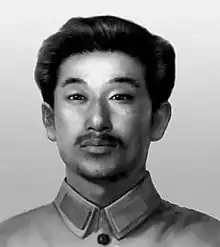Zhao Shangzhi
Zhao Shangzhi (simplified Chinese: 赵尚志; traditional Chinese: 趙尚志; pinyin: Zhào Shàngzhì; 26 October 1908 –12 February 1942) was a Chinese military commander. Born into a peasant-turned-intellectual family in Chaoyang, Liaoning, he participated in the May Thirtieth Movement in 1925, and joined the Communist Party of China in the same year.[1] In November 1925, he went to study in the Whampoa Military Academy in Guangzhou.
Zhao Shangzhi | |
|---|---|
 | |
| Born | 26 October 1908 Chaoyang, Zhili, Qing Dynasty (now Chaoyang, Liaoning, China) |
| Died | 12 February 1942 (aged 33) Luobei County, Heilongjiang, Manchukuo (now Hegang, Heilongjiang, China) |
| Allegiance | |
| Service/ | |
| Commands held | Northeast Anti-Japanese United Army |
| Battles/wars | Second Sino-Japanese War † |
After 18 September 1932 he took the charge of the CPC Northeast military division. In October 1933, he was in charge of Zhuhe anti-Japan guerrillas, and was promoted to commander of the Northeast Anti-Japanese United Army in 1934.[2]
On 12 February 1942, he was captured by Japanese military police after being attacked by an agent provocateur, and died later at the age of 34.
The city of Zhuhe, where he fought against the Japanese, was renamed to Shangzhi in his memory.
References
- 日本战犯的再生之地: 中国抚顺战犯管理所. 五洲传播出版社. 2005. pp. 20–21. ISBN 978-7-5085-0734-7.
- Shen, Zhihua (2015-01-02). "On the Eighty-Eighth Brigade and the Sino–Soviet–Korean triangular relationship – A glimpse at the international antifascist united front during the war of resistance against Japan". Journal of Modern Chinese History. 9 (1): 3–25. doi:10.1080/17535654.2015.1030831. ISSN 1753-5654. S2CID 142689460.